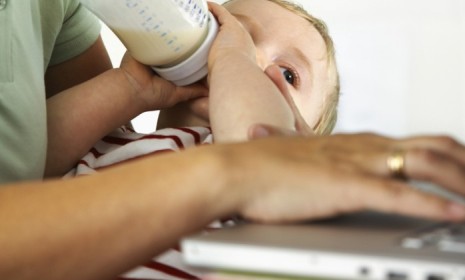Is it safe to get breast milk through Facebook?
Despite FDA warnings, new mothers are turning to the social networking site to find milk for their babies

A free daily email with the biggest news stories of the day – and the best features from TheWeek.com
You are now subscribed
Your newsletter sign-up was successful
For some new mothers, Facebook is a way to share both adorable baby photos... and breast milk. Last month, two mothers launched a Facebook network called "Eats on Feets" — a curious play on "Meals on Wheels" — to connect mothers who have extra breast milk with other moms who need to supplement their own supply. While the network has quickly grown across all 50 U.S. states and 22 countries, the Food and Drug Administration issued a warning this November against feeding babies milk acquired over the internet or directly from other individuals. How dangerous is that really?
It's unsafe and unregulated: "There are opportunities for disaster," says Dr. Ruth Lawrence, a professor of pediatrics at the University of Rochester School, as quoted by CBS News. The FDA has recommended that mothers instead use "milk banks," places that "collect, process, handle, test, and store" breast milk. That's safer than turning to the internet for milk from someone who may or may not be healthy.
"Milk sharing for babies risky, FDA says: What's the danger?"
The Week
Escape your echo chamber. Get the facts behind the news, plus analysis from multiple perspectives.

Sign up for The Week's Free Newsletters
From our morning news briefing to a weekly Good News Newsletter, get the best of The Week delivered directly to your inbox.
From our morning news briefing to a weekly Good News Newsletter, get the best of The Week delivered directly to your inbox.
Mothers are capable of managing the risks: Women donating their milk are already using it for their own children and naturally they "want to do the best thing for their babies," says Emma Kwasnica, one of the co-founders of Eats on Feets, as quoted by Health Day. "To suggest otherwise is quite patriarchal" and politicizing. We're not "drug dealing or doing something crazy" — it's just sharing milk. "We're so afraid of bodily fluids in North America. But breast milk is... not like semen or blood. It's a food."
"FDA weighs in as sharing of breast milk booms"
Women have been doing this for ages: Though the government has issued warnings against it, women have been informally sharing milk and using wet nurses "since the dawn of time," says Andrea Gordon in The (Toronto) Star. It's a cause for concern now because social media has extended its reach and attracted attention, but for mothers who can't provide milk themselves but still "want their babies to receive the valuable nutrients and antibodies" it offers, there are few other options.
"Breast-milk banks latch on to social media"
A free daily email with the biggest news stories of the day – and the best features from TheWeek.com
-
 What to know before filing your own taxes for the first time
What to know before filing your own taxes for the first timethe explainer Tackle this financial milestone with confidence
-
 The biggest box office flops of the 21st century
The biggest box office flops of the 21st centuryin depth Unnecessary remakes and turgid, expensive CGI-fests highlight this list of these most notorious box-office losers
-
 What are the best investments for beginners?
What are the best investments for beginners?The Explainer Stocks and ETFs and bonds, oh my